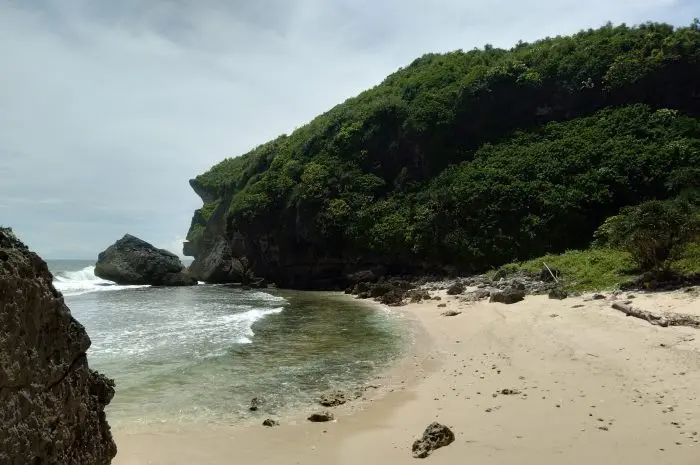Nglangkap Beach, located in the picturesque district of Gunung Kidul, Yogyakarta, Indonesia, is a breathtakingly beautiful coastal destination that has captivated the hearts of beach lovers and nature enthusiasts alike. Known for its enchanting white sands and exotic coral rock formations, Nglangkap Beach offers a unique and serene escape from the hustle and bustle of city life. In this detailed article, we delve into the various aspects of Nglangkap Beach, exploring its natural beauty, activities, ecological significance, and its appeal as a tourist destination.
Pristine Natural Beauty
Nglangkap Beach is distinguished by its expansive stretch of fine white sand, which offers a stark and stunning contrast to the vivid blue waters of the Indian Ocean. The beach is further adorned with unique and exotic coral rock formations, which not only add to its aesthetic appeal but also provide a fascinating insight into the geological history of the area.
The natural setting around Nglangkap Beach is relatively untouched and unspoiled, giving visitors the opportunity to enjoy the beach in its natural state. The serene and tranquil atmosphere of the beach makes it an ideal spot for those seeking peace and relaxation.
Read Also: Typical Papuan Food that is Famous for Being Delicious and That You Must Try
Seclusion and Tranquility
One of the most appealing aspects of Nglangkap Beach is its relative seclusion compared to more popular beaches in the area. This lesser-known gem offers a sense of privacy and serenity, making it a perfect destination for those looking to escape the crowds. The calm and peaceful environment is conducive to relaxation, meditation, and rejuvenation.
Recreational Activities
Despite its tranquility, Nglangkap Beach offers a range of activities for visitors. The clear waters are ideal for swimming and snorkeling, allowing guests to explore the vibrant marine life and the beautiful coral reefs. The beach is also a popular spot for fishing, with the rich marine ecosystem providing ample opportunities for anglers.
For those who prefer land-based activities, the beach’s unique coral rock formations provide an excellent opportunity for exploration and photography. The surrounding area also offers scenic trails for hiking and trekking, offering stunning views of the coastline and the surrounding landscapes.
Ecological Significance
Nglangkap Beach plays a crucial role in the local ecosystem. The beach and its surrounding waters are home to diverse marine life, including various species of fish, corals, and other marine organisms. The preservation of this natural habitat is vital for maintaining the ecological balance of the region.
Efforts are made to preserve the beach’s natural beauty and to protect its marine ecosystem. Visitors are encouraged to respect the environment and to engage in responsible and sustainable tourism practices.
Accessibility and Facilities
Nglangkap Beach is accessible via a scenic route that passes through the lush landscapes of Gunung Kidul. The journey to the beach itself is an enjoyable experience, offering picturesque views of the countryside and the local way of life. Basic facilities such as parking, restrooms, and small food stalls are available near the beach, catering to the needs of visitors.
Hot Topics: Typical Maluku Food that is Famous & You Must Try
Conclusion
Nglangkap Beach in Gunung Kidul is a captivating destination that offers a perfect blend of natural beauty, tranquility, and recreational opportunities. Its pristine white sands, exotic coral rock formations, and serene atmosphere make it an ideal spot for a peaceful getaway. As a hidden treasure in Gunung Kidul, Nglangkap Beach invites visitors to enjoy its unspoiled beauty and to experience the enchanting charm of one of Yogyakarta’s finest beaches.







